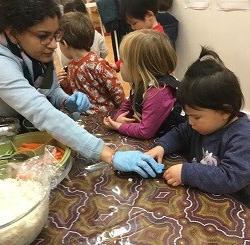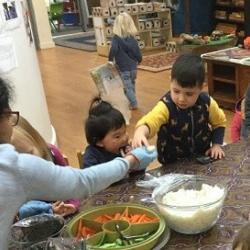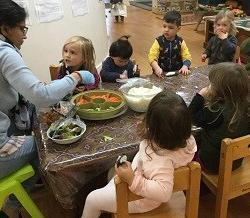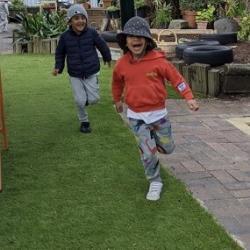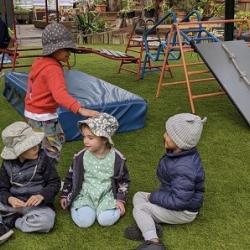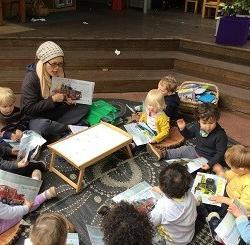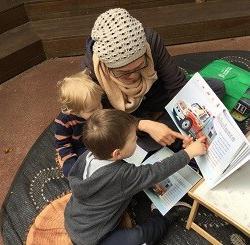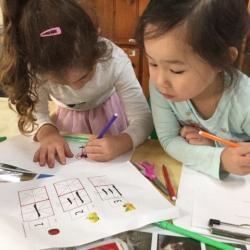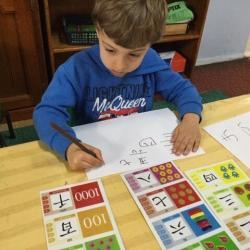Gorton House
The children in our Gorton House toddler’s room have been showing an interest in pretend cooking experiences in their indoor home corner area and in the sandpit. The children love playing in different roles and scenarios while they engage in imaginative play. Some of their favourite things to pretend to cook are pizza, pasta and sauce, soup, cakes and pies. Educators engage and extend on the children’s learning during to encourage them to learn about making healthy food choices. Such discussions often lead to children trying foods in real life that they wouldn’t have normally tried. These discussions are also a great opportunity to talk with the children about healthy foods and those that are ‘sometimes’ foods.
To continue on with children’s interest in cooking experiences, educator Gunjan decided to make sushi with the children. Often the centre has left over rice and sauce from lunch and, rather than wasting this, Gunjan was able to use it to make sushi with the children. She cut up some thin cucumber and carrot slices and bought some sushi sheets (nori) in, which she cut into small pieces so that children could make their own sushi. After first demonstrating how to make the sushi, Gunjan offered the children the selection of ingredients. She initially assisted them with the ‘rolling’ and ‘pressing’ of the ingredients they liked, and then after some practice many of the children were keen to make the sushi by themselves.
There was lots of conversation between the children as they shared their achievements with each other and mastered the various strategies of rolling, stuffing and eating their sushi. This experience was a great way to remind the children about not wasting food, as they were able to use some of the left over rice from lunch. It was also good for extending the children’s vocabulary and language skills, as well as further developing their fine motor, sensory and social skills, and their self-confidence
Johnson House
The children in Johnson House have been enjoying the newly laid softfall and synthetic turf in their playground this week. Some were intrigued by this new texture, and used their hands and even their whole bodies to explore this. The environment plays such a crucial part in children’s learning; this revitalised space was a great reminder of the opportunities for learning a space can bring. The children used the space creatively, inventing games, exploring the equipment or simply just sitting down and chatting amongst themselves in different parts of the space. The centre’s educators have been reflecting on and planning for the outdoor environment, and are using this refurbishment project as an opportunity to design new spaces, and to work with the children to develop ideas and set up learning spaces which allow for creativity and skill development.
The Early Years Learning Framework highlights how both indoor and outdoor environments support all aspects of children’s learning. Using these spaces thoughtfully helps to invite conversations between children, early childhood educators, families and the broader community, and promotes opportunities for sustained shared thinking and collaborative learning.
Murray House
Infants
The toddlers in Murray House continue to pursue their interest in exploring and learning about different vehicles. They are particularly interested in those they often see on the streets, such as ambulances, dump trucks, concrete mixers, mobile cranes, refrigerator trucks, road trains and tankers. One of the children’s favourite books to read in relation to this topic is ‘Trucks’, one of the ‘Mechanic Mike’s Machine’ series by David West.
Educator Mandy facilitated a memory matching game using pictures from this book, targeting children’s ability to maintain focus, increase their attention to detail and develop their ability to find similarities and differences in objects, as well practice early mathematical skills such as classification and grouping.
It has been amazing for educators to observe the children learning new vocabularies and to witness their ability to learn about concepts such as the telescopic arms on mobile cranes, refrigerated rooms inside cooling trucks, and freight wagons on road trains. The children have shared their understandings about the main parts of particular vehicles, and their distinctive features, such as the water hose and ladders on a fire truck, and the arm and hook at the back of a tow truck. The educators will continue to explore this topic in the coming weeks, focusing on the children’s cognitive development and language skills.
Toddlers
This week the educators in Murray House toddlers have continued to support the children to identify and name emotions through reading story books. To assist children to manage their emotions, educators have also introduced a ‘visual strategy board’. This board shows pictures of emotions such as ‘mad’, ‘frustrated’ and ‘cranky’, and it also shows some choices that children can make to manage these emotions, such as ‘take deep breaths’, ‘walk away’, ‘tell the person how they feel’, or’ ask a teacher for help’.
This week the educators also intentionally extended the children’s cognitive skills through shape and colour matching experiences and counting games.
The children have also recently shown a strong interest in trucks and other vehicles. They are constantly filling up dump trucks with dirt or sand and transporting them around the yard. This interest has been extended upon by educators through reading books and looking at photos of trucks and vehicles during language groups, as well as the provision of new toy trucks vehicles. These new resources are very popular. Their introduction has also given the educators opportunities to support children to further develop their social skills and language skills. For instance, encouraging children to use verbal language to ask for a turn, and supporting them to wait or to use another vehicle, and to share, take turns, and develop an awareness of fairness.
Rigby House
Learning through music
In Rigby House, the children love to tap on various objects and to enjoy the sounds they make. The educators are supporting and extending this interest by introducing the children to using tapping sticks.
This enjoyable experience enhances the children’s language development and listening skills, as well as their creative thinking and problem solving skills, as they work hard to listen to the beat and the words of the songs they are singing, and to follow their educator’s lead.
The children are learning about musical concepts such as rhythm and beat, as well as about directionality, as they tap their sticks up and down, high and low.
The children love these simple percussion instruments, and this fun experience supports them to learn to slow down, and develop their ability to focus and concentrate.
Robinson House
One of the educators in Robinson House, Emily, has been incorporating Mandarin into the preschool program. Emily provides different opportunities for the children to practice Mandarin, embedding aspects of the children’s interests and topics from existing projects into this group.
Emily has been facilitating this regular Mandarin group time for the children for some time, and each week the children are learning many new skills and extending their language and literacy. For example, the children have learnt a range of songs in Mandarin, and they have been introduced to dialogue and phases spoken in Mandarin, such as words of greeting. These group times also help to extend the children’s vocabulary in English as they identify the names of animals, body parts and some activities that people do in their leisure time.
Emily draws on her teaching experience and her understanding of social justice as she shares her diversity and encourages the children to celebrate difference. The children are intrigued by the amazing stories that Emily shares with them, as well as the unique creativity that Emily adds to this group. Through this group the children participate in diverse creative arts, gardening and music experiences. Most recently Emily has introduced the children to calligraphy.
Families often express how grateful they are that Emily shares her skills, home language and culture with the children, and some parents have said that their children are also excited to teach them how to speak Mandarin at home.
